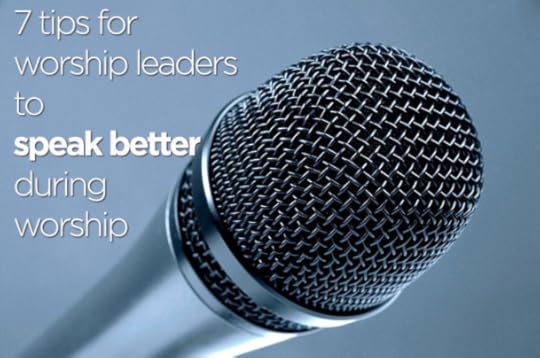Gangai Victor's Blog, page 7
October 9, 2014
Free Worship Song: Your Grace is Enough
Just click here and it's all yours!
The free digital download contains the MP3 file and a PDF chord chart.
Yes, it's really that easy!
Song creditsSung by: Catherine Claret Harry
Written by: Gangai Victor
Composed by: Gangai Victor & Robert Martin
Music direction, arrangements, mixing and mastering: Gerard Joseph
Hope the song helps you in your worship, let me know what you think in the comments.


October 4, 2014
5 Foolproof Steps to Introduce Your Own Worship Songs to the World
For a worship songwriter, few things are more frightening than playing a song publicly... for the first time.
"What if it crash lands the worship?", "what if they hate it?", "what if they don't sing along?", "what if..." are only some of the inner questions that we struggle with, right?
Trust me, introducing a song before it's fully ready is quite the heartbreaking mistake!
Developing a very thick skin to withstand the holes that others could poke into our works of art is essential for any creative artist. That apart, here are some effective measures to get our songs 'public worship' ready before introducing them on stage. 5 Surefire Steps to Safely Introduce Your Own Worship Songs Step 1: Be sure of the song's purpose
Is the song a secret prayer to the Lord? Is it meant to be sung in public at all? I mean, not all worship songs are strictly public church songs, right? If it's not meant for a congregation and it's written solely to express your heart personally to the Lord, the song has already achieved its purpose. Step 2: The personal test
If you're sure the song is meant for congregational worship, create a rough recording of it. Hook a mic to your PC and record it with a piano or acoustic guitar. If that's too complex for you, use any voice recording app on your smartphone.
Listen to the mock recording yourself. No matter how good you think the song is, hearing a recording of it always helps to notice flaws and tweaks that we otherwise tend to miss.
Now, give it a break and listen to it again on a weekly or fortnightly basis. Do this 3 or 4 times and make those adjustments that you identify.
If you still like the song, you're ready for the next step. Else, go back to the drawing board, and rewrite and/or recompose! Step 3: The peer group test
Play your song to a trusted group of friends who understand your art—people who are worship leaders, songwriters or musicians themselves and ask for their honest feedback. Oh and be sure to put on the armor of thick skin before you ask them!
Listen to their views impassively—while you don't have to agree with everything they say—listen carefully—you will get useful points of improvement. Also, pay attention to a suggestion, especially if it comes from more than one person.
Make changes to your song if required and repeat steps 2 and 3 until there is some kind of a consensus that the song is a good one. Step 4: The non-musician test
By now, you should have sorted out any musical and technical flaws at least, which is great but still not enough.
It's also important to estimate what someone in the congregation would think of your song. So play it for a non-musician friend to get what I call "qualitative" feedback—you know, things like "It doesn't speak to my heart" or "I don't get it, what's it about again?" and so on.
If the song makes a positive impression on the non-musician, you're on to something!
Else, the song is probably still not ready and needs more work. Step 5: Playing it live
Now it's time to include your song in your next worship set-list and see how it goes in the real world of congregational worship.
If you've followed the previous 4 steps diligently, your song should work out well with your congregation. You would also be a lot more convinced about the song yourself and be confident of playing it live. Take time to teach it, reprise it at the end of the meeting/service, use it again in the next few weeks and then gauge its effectiveness in church worship. Conclusion
As a songwriter, don't rush this process and burn your song—patience always leads to better songs.
In fact, all of the above steps are useful to get your song truly ready, if you're planning to record a proper demo of your song too. Otherwise you might end up burning the song and your money! Hope you found these tips useful. How have you introduced yours songs to your congregation? Why not share your top tips in the comments?
Image: http://pixabay.com/



September 19, 2014
4 Attitudes That Mess Up Team Spirit and Ruin Relationships
The best worship teams don’t need to have the best musical or vocal talent.
But they undoubtedly need to have the best of relationships within.
Anointed worship teams are more often than not made up of people who genuinely like each other, regard each other positively, encourage each other, and treat each other fairly. It’s not too difficult to understand that it’s probably because in God’s eyes, it’s wonderful and beautiful “when brothers and sisters get along!” (Psalm 133:1, MSG).
In fact, God loves it so much when His people get along that He “commands the blessing” (Psalm 133:3 MSG) when we manage to!
One of the best things we can do as a worship team, when there are struggles to get along with each other is to check our attitudes—most of the time, that’s where the challenge lies!
So let’s look at some attitudes that we need to be avoiding to build, and maintain excellent worship teams 4 Harmful Attitudes That Spoil Relationships in a Team I am the best
Musically, maybe that’s true—in any team, some musicians will of course possess greater skills than others. But, that’s no reason to rub it in all the time sporting an I-am-better-than-you attitude.
And, it need not be confined to musical skills alone. We can also express things like “I pray longer, so I am more spiritual”, “I can quote more scripture, so I am holier”, “I am a full-time worship leader, you’re not, so I am more anointed”, and so on.
Remember the parable of the Pharisee and the tax collector in Luke 18:9-14? At times, we can tend to be like that Pharisee putting others down, and raising ourselves up. God didn’t like it then and hasn’t changed His opinion since. You need to change, not me
Remember those times when we listened to a sermon thinking, “I hope _______ (insert team member name) is listening to this point and understands it’s for him/her!”
We love to see others change, but we just cannot see it as easily when we need to. “It applies to others, not me” is not an attitude that helps the team in any way! Many a time, we need to be the change to bring about transformation in our ministry. I am never wrong
It’s impossible for anyone to be right… all of the time! Though we know that no one is perfect, we find it so hard to acknowledge to others when we are wrong, right?
But guess what, the people in any team who command more respect, are those who are willing to admit it when they are in the wrong. I don’t need you
“For no matter how significant you are, it is only because of what you are a part of. An enormous eye or a gigantic hand wouldn't be a body, but a monster. What we have is one body with many parts, each its proper size and in its proper place. No part is important on its own. Can you imagine Eye telling Hand, "Get lost; I don't need you "? Or, Head telling Foot," You're fired; your job has been phased out "?” (1 Corinthians 12:21-24 MSG)
Need I say more? This is a brilliant Bible verse to apply to our worship teams! Let’s remember that none of us have the right to say to a person in our team that he/she is not needed—it’s probably one of the worst attitudes that we can carry!
So let’s stop grousing that our guitarist is not like Lincoln Brewster; or our drummer is not like Carl Albrecht. Instead, let’s aspire for contentment with those that we have been blessed with, and joyfully look forward to growing together in unity and harmony.
When there is mutual respect and bonding within the team, the payoff for everyone including our church is multi-dimensional—we will be well able to tune into the heart of our God; our rehearsals will be pleasant, and productive; our ministering will be blessed; our congregations will better connect through our authenticity; our relationships will be deeper than just a “ministry colleagues” level; and more!
Mother Teresa once said that a family that prays together stays together—it’s no different for a worship team! Let’s worship together, stay together, and edify the Body of Christ. While some of these are picked up from personal experience, I’ve learnt more by listening to others—so I am keen on hearing from you. Do you agree that better relationships lead to better ministry among other things? From your experiences, can you share what else can negatively affect relationships in a worship band?
Image: http://pixabay.com/



August 29, 2014
The Challenge of Vicky Beeching and Diverse Sexual Preferences
Celebrity controversies are all over the Christian Fifth estate, right?
While Gungor's view on the Bible is an opinion and Driscoll's issues will go down as one man's craziness, Vicky Beeching's coming out story is different—it's a controversy on steroids and is more likely to affect the church at large (if it already hasn't that is!).
In fact, her saga has somewhat been akin to the recent Miley Cyrus circus with more or less similar results: intensely polarized reactions and opinions accompanied by truckloads of publicity. If Vicky writes a book now, I bet it will be a New York Times bestseller!
So Why is This Topic Catching Fire?Maybe because it rocks the very concept of 'family'. Since it's family that shapes 'community' and the church is basically a community of worshipers, a shift in how we define family is bound to affect our worship.
And btw, this isn’t a post about whether Vicky Beeching is prophetic or heretic—I continue to respect her as a person, Christian and artist.
I'm posting my 2 cents 'cos I believe this topic is worth discussing. Though the challenge is in taking it on without judging/hurting/offending anyone, I'm going to try here.
How Did We Get Here?The more I think about it, the more I believe that we have changed the way we accept scripture. Instead of studying it to understand what it teaches, we'd rather feel/believe something first and then look for verses to convince ourselves that that's what the Bible really says. Our fancy is more in what Scripture means to us than in what it actually means.
This self-centered approach is a clear and present danger to any Christian belief because ultimately, what's socially popular becomes truth. Instead of the church evangelizing society, the opposite is becoming the norm—society is deciding and lobbying for what Christianity should believe and teach... and successfully too in many cases, this subject being a prime example!
While a largely anti-Christian media and a confident pro-LGBT lobby are exploiting each other for their respective agendas, the collective voice of regular churches is being grossly undermined. We’re at a point where traditional Christians are facing an ultimatum of sorts: accept LGBT marriage or endure a variety of labels—like Obsolete. Judgmental. Uncharitable. Loveless. Graceless. Bigot.
But Why Can't the Bible Settle it?'Cos appeals to Bible verses on this topic lead to predictable debates like this:
Traditional Christian: See? In Romans 1:24-32, Paul has clearly taught that this is a grave sin! Pro LGBT Christian: Of course not! If you see the context of those verses, you'll understand Paul was condemning idolatry, not homosexuality! Traditional Christian: Really? Then let's apply the same context to the entire set of verses and declare wickedness, evil, greed, gossip, slanderer, hating God, etc. as also not sin. You can't have it both ways! Pro LGBT Christian: No, can't you understand that David was a man after God's heart, but was in a same-gender relationship with Jonathan? Traditional Christian: Oh yeah? David was gay? How do you explain Bathsheba......and so on! The absence of an acceptable authority (I mean in the non-Catholic world) to decide who is right/wrong ensures the Bible is effectively rendered inconclusive and powerless.
The Slippery SlopeA typical 'coming out' story of a Christian goes something like this:
I realized I was different when I was 'x' years old Traditional Christian teaching made me feel awful and ashamed about myself I sought help and no prayer changed me God must have made me this way, therefore I am normal Why can't the church just accept me as I am and love me (love = accepting same-sex marriage)But, same-sex attraction is not the only variation in human sexuality, right? A pedophile could also 'come out' with the exact same story. Ditto for a zoophile. Pedophilia is not mentioned directly in the Bible while zoophilia is not touched upon in the New Testament. So logically we could (not saying we should) make a stronger case for them than LGBT marriage.
If the church is to love all non-straight people just like how it's being compelled to love LGBTs, won't we go down a very slippery slope? Like child marriage with an adult? Or humans with animals? Not to mention others with a bone in this fight—polygamy anyone?
While the can of worms is well and truly open, it's likely that heterosexuality vs. homosexuality discussions are just the tip of a massive iceberg. In time, the ring will probably widen to lobby for all other kinds of sexual relationship preferences. You think that's impossible? Well, 50 years ago, people thought so about same-sex relationships and yet here we are!
Should/will we ever draw a line? If yes, where? And who decides?
The Way ForwardPlease, let's not hate, judge and cloud ourselves with intolerance—we already have too many walls! Disagreeing people need not be enemies. See the example of Pope Francis apologizing to the World Evangelical Alliance and its return apology by Rev. Dr. Geoff Tunnicliffe. That's a great example of how we should be behaving.
Let's put on the mind of Christ, talk, discuss, exchange thoughts, reach out and pray for God's Kingdom and His will.
To the shocked and the outraged: calm down, the church has seen far worse—Christ will always see us through To the angry and the disgusted : please show respect for people with differing thoughts/beliefs/struggles—hear them out and reach out with love To the disappointed and the sad: please make Christ your role model/hero and you won't be To everyone: Let's pray for each other that the Holy Spirit may lead us to His Truth and His light So how has this topic made you feel and think? How can we handle controversial subjects like same-gender relationships in a Christ-like manner without causing hurt and offense? Will this impact our worship? Why don't you leave a comment and share your thoughts?


August 28, 2014
The Challenge of Vicky Beeching and Diverse Sexual Orientations
Celebrity controversies are all over the Christian Fifth estate, right?
While Gungor's view on the Bible is an opinion and Driscoll's issues will go down as one man's craziness, Vicky Beeching's coming out story is different—it's a controversy on steroids and is more likely to affect the church at large (if it already hasn't that is!).
In fact, her saga has somewhat been akin to the recent Miley Cyrus circus with more or less similar results: intensely polarized reactions and opinions accompanied by truckloads of publicity. If Vicky writes a book now, I bet it will be a New York Times bestseller!
So Why is This Topic Catching Fire?Maybe because it rocks the very concept of 'family'. Since it's family that shapes 'community' and the church is basically a community of worshipers, a shift in how we define family is bound to affect our worship.
And btw, this isn’t a post about whether Vicky Beeching is prophetic or heretic—I continue to respect her as a person, Christian and artist.
I'm posting my 2 cents 'cos I believe this topic is worth discussing. Though the challenge is in taking it on without judging/hurting/offending anyone, I'm going to try here.
How Did We Get Here?The more I think about it, the more I believe that we have changed the way we accept scripture. Instead of studying it to understand what it teaches, we'd rather feel/believe something first and then look for verses to convince ourselves that that's what the Bible really says. Our fancy is more in what Scripture means to us than in what it actually means.
This self-centered approach is a clear and present danger to any Christian belief because ultimately, what's socially popular becomes truth. Instead of the church evangelizing society, the opposite is becoming the norm—society is deciding and lobbying for what Christianity should believe and teach... and successfully too in many cases, this subject being a prime example!
While a largely anti-Christian media and a confident pro-LGBT lobby are exploiting each other for their respective agendas, the collective voice of regular churches is being grossly undermined. We’re at a point where traditional Christians are facing an ultimatum of sorts: accept LGBT marriage or endure a variety of labels—like Obsolete. Judgmental. Uncharitable. Loveless. Graceless. Bigot.
But Why Can't the Bible Settle it?'Cos appeals to Bible verses on this topic lead to predictable debates like this:
Traditional Christian: See? In Romans 1:24-32, Paul has clearly taught that this is a grave sin! Pro LGBT Christian: Of course not! If you see the context of those verses, you'll understand Paul was condemning idolatry, not homosexuality! Traditional Christian: Really? Then let's apply the same context to the entire set of verses and declare wickedness, evil, greed, gossip, slanderer, hating God, etc. as also not sin. You can't have it both ways! Pro LGBT Christian: No, can't you understand that David was a man after God's heart, but was in a same-gender relationship with Jonathan? Traditional Christian: Oh yeah? David was gay? How do you explain Bathsheba......and so on! The absence of an acceptable authority (I mean in the non-Catholic world) to decide who is right/wrong ensures the Bible is effectively rendered inconclusive and powerless.
The Slippery SlopeA typical 'coming out' story of a Christian goes something like this:
I realized I was different when I was 'x' years old Traditional Christian teaching made me feel awful and ashamed about myself I sought help and no prayer changed me God must have made me this way, therefore I am normal Why can't the church just accept me as I am and love me (love = accepting same-sex marriage)But, same-sex attraction is not the only variation in human sexuality, right? A pedophile could also 'come out' with the exact same story. Ditto for a zoophile. Pedophilia is not mentioned directly in the Bible while zoophilia is not touched upon in the New Testament. So logically we could (not saying we should) make a stronger case for them than LGBT marriage.
If the church is to love all non-straight people just like how it's being compelled to love LGBTs, won't we go down a very slippery slope? Like child marriage with an adult? Or humans with animals? Not to mention others with a bone in this fight—polygamy anyone?
While the can of worms is well and truly open, it's likely that heterosexuality vs. homosexuality discussions are just the tip of a massive iceberg. In time, the ring will probably widen to lobby for all other kinds of sexual orientations. You think that's impossible? Well, 50 years ago, people thought so about same-sex relationships and yet here we are!
Should/will we ever draw a line? If yes, where? And who decides?
The Way ForwardPlease, let's not hate, judge and cloud ourselves with intolerance—we already have too many walls! Disagreeing people need not be enemies. See the example of Pope Francis apologizing to the World Evangelical Alliance and its return apology by Rev. Dr. Geoff Tunnicliffe. That's a great example of how we should be behaving.
Let's put on the mind of Christ, talk, discuss, exchange thoughts, reach out and pray for God's Kingdom and His will.
To the shocked and the outraged: calm down, the church has seen far worse—Christ will always see us through To the angry and the disgusted : please show respect for people with differing thoughts/beliefs/struggles—hear them out and reach out with love To the disappointed and the sad: please make Christ your role model/hero and you won't be To everyone: Let's pray for each other that the Holy Spirit may lead us to His Truth and His light So how has this topic made you feel and think? How can we handle controversial subjects like same-gender relationships in a Christ-like manner without causing hurt and offense? Will this impact our worship? Why don't you leave a comment and share your thoughts?


August 16, 2014
3 Critical Questions That Could Change the Way You Lead Worship
Experience teaches us loads of stuff that can rarely be learnt from any other source. However, experience also brings with it the curse of going through the motions.
I mean, we've led worship so many times that now, we are able to do it with our eyes closed (pun intended!) now, right?
Have you been there? If you have, then you know the fallout of reaching this point: stale worship that bores us and the congregation!
In this post, let's look at 3 questions, which I believe could help refresh us and gain new focus in our worship.
3 Questions for Reflection That Could Transform How You Lead Worship 1. Are You self-indulgent?Check the content of what you're speaking—is it full of 'I-me-myself' stuff? If it is, you're turning people off more than you realize!
Here's the thing about effecting pastoring: If we want people to be interested in us and our ministry, we need to be interested in the Lord and His people first.
Speak about the Lord and His works more and you will see people responding better. Be a caring pastor who exalts the Lord and engages His people than a self-indulgent bore who punctuates every word and sentence with the "I" pronoun.
2. Are You a Clone?Don't get me wrong, imitation is a good thing—though it depends on who we are imitating!
But, maybe you're attending way too many conferences and trying to implement everyone else's methods but yours... maybe you're spending disproportionate amount of time with your guitar than with the Lord... maybe you hero-worship Redman, Baloche, Tomlin, Brewster, Houghton and want to be like them so much that you've become a clone of them and lost yourself in the process.
The Lord wants YOU leading worship the way YOU lead worship just as much as he prefers Redman leading worship like Redman.
So, if you've been over-influenced by someone else, turn around now and be your unique self—even while implementing the good things we learn from others.
3. How Deep Are You?Do you pray daily? Read/study the Bible, spiritual books regularly? Invest in training yourself and your team?
Or are you one of those mediocre worship leaders happily swimming in shallow waters? Do you pick songs that have solid meat to feed your congregation or are you satisfied with any catchy tune out there?
In the long run, people always respect and connect better with depth—not superficiality.
Do you agree? How else do you think we can maintain a God-focused worship ministry? Feel free to leave a comment and share your thoughts!Image: http://pixabay.com/



July 31, 2014
7 Tips for Worship Leaders to Get Better at Speaking During Worship
Speaking is probably the no. 1 pet peeve people have against worship leaders.
More specifically—what we speak, when we speak, how we speak, and above all—how long we speak!
Now, this doesn’t mean we should stop speaking all together! But, a greater focus on speaking well, will help us add value to the worship with our words, instead of them becoming a hollow distraction.
Singing songs is only one component of our worship—speaking the right things at the right time matters too in the interest of building a positive connect with the congregation. Here’s a simple 7-tip guide to get better at using words in worship 1. Plan ahead
When planning worship, don’t stop with just creating great set-lists. Visualize the moments in the set when it would be appropriate to speak. Prepare for those moments with scripture verses, an inspirational insight, or maybe even something about the song.
You don’t need an airtight memorized script; but don’t leave everything to the last moment either. Plan the content (brief points) around which you will be speaking, in advance. This will shield you from nervous random rambling. 2. Look
Think of it as any other conversation—how would anyone feel if you close your eyes and talk to them? Not cool, right?! So, open those eyes and look at your people. If that scares you, here’s a public speaking trick: start by looking at the heads of people (their hair basically!) instead of their faces. People will still feel like you are looking at them.
And smile too while you’re at it. 3. Invite
Let’s say you want the congregation to experience worshipping with uplifted hands. “C’mon people, lift those hands” would sound a bit instructional, and may put off some people.
Instead, we could try something like, “You know, the Bible tells us in Psalm 134:2 to raise our hands and bless the Lord. Can we try that now and use our hands to praise Him as we continue to sing to Him?” You see, ‘we’ and ‘us’, are better than ‘you’ and ‘do’.
I loved how Paul Baloche did it during a concert—“The Bible tells us to praise the Lord by lifting up our hands. For those who are comfortable with this posture, why don’t we raise our hands…” (I’m paraphrasing here, but you get the idea).
Be invitational, conversational, and one-of-the-congregation instead of using ‘me’ vs. ‘you’ language. There are not too many people out there who like an aloof megastar. 4. Pick your moments
Don’t speak between every song in the set—that would make us annoying one-trick ponies. If a lyric needs more explanation, do it at the beginning of the song on top of the musical transitions. You could say a few words during an instrumental solo too.
And btw, stop calling out every line in the song when people have it on the screen anyways—not clever! If need be, call out only the first line of the next song section (verse, chorus, bridge etc.), so that the person managing the slides, the band, and the people are all in sync with you. 5. Include emotions
People connect better when we rope in emotions and feelings, so feel free to use emotionally descriptive language.
Examples: “Let’s experience the joy of singing to the Lord freely!” Or “How amazing, friends, that we are able to join with Heaven now as we worship the Lord!” 6. King of the content is… the King!
Like the songs that we sing, our words also need to point to God—nothing more, nothing less, and nothing else. Talk more about the Lord, and less about ourselves. For e.g., suppose we are singing “You Alone Can Rescue”, we could say something like this:
“Friends, this song is a wonderful reminder that no matter how great the divide, the grace of Christ is far greater; it’s more than enough for all us! Maybe some of us are feeling frustrated at not being able to beat a particular habit, or a sin. Instead, let’s lift our eyes to the grace that has already rescued us! This grace will surely lead us home! Trusting this grace, let’s sing the chorus again with joyful and thankful hearts!”
To sum up—let’s choose words that glorify God, and draw people to Him. 7. Watch the clock
No matter how wonderful a speaker you are, the worship leader’s speaking can only make passive listeners out of the congregation. One of our more important goals is active participation. So consciously practice brevity and limit yourself to 30-45 seconds. If you want to speak longer, you better be super-led by the Spirit! Also, to maintain clarity and focus, it helps to share just one thought or scripture verse at a time. I am sure you agree that speaking well is important when leading worship. Do you find these tips useful? Can you drop a comment and share what works/doesn’t work when the worship leader speaks during your church’s worship?


July 10, 2014
WorshipSong Band - When You Need to Fill in for Missing Musicians or the Whole Band!
In the previous post, we saw a few ways to lead worship without music. But, what if you still want to use music without musicians?
Then, the solution you'd want is backing track software.
Backing tracks have been around for some time now, but in recent years, the tech to use them has advanced substantially—so much so that it’s quite easy and convenient to set things up quickly and start leading worship. There are many worship specific backing tracks software out there—I have mentioned Band-in-Hand before; then there’s Worship Backing Band made by the cool folks at Musicademy, Fly Worship etc.
In this post, we’ll look at WorshipSong Band—a versatile, cross-platform and flexible solution to setup and use backing tracks in worship. You can install it in on almost any kind of hardware/OS—iPAD, Android tablets, Mac and Windows machines. And, it’s also totally affordable ‘cos it’s available at the price of FREE!
Let’s take a look at WorshipSong Band's features
Watch the video for an overview of WSB:
Supports 12 tracks with a separate click track and ambient pad feature to playback pad loops between songs Tracks can be mixed (presets available), pitch shifted, and looped in any order Ability to spontaneously move between sections of a song with a foot pedal (looping, song flow, dynamics and song order can be controlled) Chord charts can be integrated and distributed to the entire band and also transposed on the fly You can also project lyrics to an external monitor—WSB can therefore double up as a church projection software too
A standout feature is the open file format that’s used by WSB freeing us to use backing tracks from various other content providers like WorshipSong.com, PraiseCharts.com,WorshipBackingBand.com, Multitracks.com, LoopCommunity.com. This gives us access to a wider selection of songs. If you want to use your own tracks, that’s possible too!
I’ve been playing around with WSB for a week now and totally like what I’m seeing so far. Mark Snyder, who runs WorshipSong Band was kind enough to provide a coupon code, which allowed me to download and test it with many songs in different keys, tempos and styles. Though I am using a very basic Android tablet, it still managed well enough.
The only issue I’ve encountered so far is with the store to buy tracks. Twice after the purchase, the download links failed because of connectivity issues at my end and forced me to buy the songs again and get new download links. If I were not using a coupon and had to actually pay for it, I would have had to pay twice! Hopefully, this will be fixed soon. Mark subsequently confirmed that he's changed the settings to allow multiple download attempts, how's that for customer service!
I also hear that a new feature to change the tempo of a song is also on the way along with an integrated metronome. According to Mark, "With this, for many resources, you will be able to use it as a built-in click track. In this case, you could buy something like a Praisecharts Rhythm track (for $2 each if you buy in bulk) or any other split track, then play the built in pads and the built in metronome, and have a great resource for very little money per song with access to a huge library. You would lose individual instrument control but for the price that's a good tradeoff. And you could mix and match these with full multi-tracks. The technology is really designed to make backing track software affordable everywhere." Considering the high price points of backing tracks, this would ease the burden for smaller ministries.
If there’s an additional feature I’d like to see in WSB, it would be the ability to add vocal cues, which works nicely in Worship Backing Band. That apart, WorshipSong Band is excellent at being the band when there is no band! I’d happily recommend it to anyone looking to get started with using backing tracks for worship.
What’s your favorite worship backing tracks software?
Image: http://pixabay.com/



June 28, 2014
5 Tips to Lead Worship Effectively Without Music
That dreaded moment when we have to lead worship and the nearest musical instrument is at least a mile away!
Have you been there? If yes, you'd know the feeling!
We depend on music and musicians to fill the worship environment so much so that without them, it feels kinda empty, right!
On the other hand, such sessions are good times to remember and put into practice an important truth: music is just one among the many vehicles available to express our worship.
So how do you lead worship without music?
5 Ways to Engage People in Worship Without Music 1. SongsUse simpler, shorter and familiar songs—teaching longer and complex songs without a musical instrument is a daunting challenge and I am yet to see anyone do it successfully (myself included). Use choruses or responsorial songs where you sing one line and the people sing the same line or a different line back to you (E.g. Hallelujah Glory, He is the Lord (Show Your Power) etc.)
2. ScriptureUse loads of scripture—verses from the Psalms work really well as also other 'songs' in the Bible like the Magnificat for instance. Read the verses aloud, designate one verse as a 'chorus' and encourage people to repeat it back as a response when other verses are being read. For example, if we are using Psalm 8, we could fix the 1st (and the last) verse as the 'response'. "
"Lord, our Lord, how majestic is your name in all the earth!" (Psalm 8: 1,9)
The worship leader can then read each verse one by one and pause after each verse for the people to respond with "Lord, our Lord, how majestic..." 3. Praise Prayers
In a small group, we can also request quick praise prayers from the people; short testimonial praise/thanksgiving prayers with a few moments of free praising at the end of each prayer. In case, your group is not too comfortable with shouting out free praise prayers, use one or two lines from a song as a refrain instead —a good example would be "God, You are my God, and I will ever praise You."
4. ChantsContemporary Christian songs are not the only musical genre for worship! There are other types of beautiful music too—like chants. They are short, easy to learn and you can repeat them easily to create a meditative/reflective atmosphere. Lookup YouTube for Taizé worship videos to start with. 5. Listen
It's good to call for times of silence in corporate worship too. As much we like to do many activities when we worship, waiting on the Lord in silence is also equally important—because it's in those silent moments that we are able to listen to the voice of our Lord. So it's only right that we give Him time to speak to us, right?
The goal for corporate worship with or without music from a worship leader's perspective remains similar: to engage people and facilitate them to participate actively and authentically. Hopefully, these ideas will help you become more comfortable to lead worship without music.
How else can we lead worship without music? Why don't you leave a comment and share your thoughts.Image: Pixabay



June 18, 2014
8 Excellent Android Apps for Worship Leaders, Songwriters and Musicians
It’s always fun to write about Android apps—‘cos there’s constantly something new to discover with more than a million apps in the play store!
You could check out my earlier articles here and at Church Mag for various lists of android mobile apps useful for worship leaders and songwriters. In this post, you will find some old and new android apps that I believe are greatly useful for you—especially if you’re a worship leader, musician or songwriter. 8 Top Mobile Apps for Worship Leaders, Songwriters and Musicians
1. Spiritual growth: Go Tandem
I’ve written about Go Tandem before, a product built with 7 years of research. Now it’s available as a mobile app too to help us avoid spiritual neglect! Take a short Spiritual Growth Assessment, based on which you will receive up to 12 messages each day via text, audio, and video customized to your unique spiritual needs, designed specifically to move you closer to Jesus on a daily basis. Other features include, push notification to ensure you don't miss a message, ability to save and share your favorites and notes to write down your thoughts. Free download.
2. Worship backing tracks: Band-in-hand
If you want a full band sound without a full band, this app may just be the solution! Excellent selection of songs to buy from. Each song has 7 tracks + 1 click track. You can create your own mix for each song (and save it for the next time), change the song key (5 key options available for each song), make/edit your own set-lists and mute/unmute any track. Probably the cheapest rates for songs ($5 to $20) when compared to other PC/Mac software currently available for this purpose.
The only downside is, the song arrangement cannot be changed unlike something like Multi Track Pro Wav Player. If flexible song arrangements were added, this would be a killer app! The app is a free download, songs need to be purchased separately. A single B-I-H account can be used to link up to 3 devices to share purchased songs between them.
3. Guitar Tuner: Fastune!
Probably the only polyphonic tuner app available at the moment. This means you can strum all 6 strings simultaneously and Fastune! will tell you if you are in tune or not, how about that! If your guitar is out of tune, Fastune! will instruct you to tighten or loosen the exact string in need—makes the tuning process super quick and easy. Free download.
4. Music player: Jet Audio
No matter how many music player apps I try out, I always keep coming back to this one. Plays almost every audio file format out there! Other features include 10-band graphic equalizer with 32 presets, Wide, Reverb and X-Bass sound effects, crossfading, gap-less playback, sleep timer up to 24 hours and more! Free and ad free Plus versions available; I wholeheartedly recommend the Plus version, it’s well worth your money.
5. Metronome: Metronome Beats
A tablet-friendly, simple and interactive metronome app designed by musicians for practicing and playing musical instruments. Facilitates any tempo selection from 1 to 300 beats per minute, tap tempo, display of Italian tempo markings, subdivision of the beat with up to 16 clicks per beat, accented first beat of the bar and visual beat indication. The pro version includes a “live” mode to create and play set lists. Free download.
6. Rhyming dictionary: Reverse Phonic Rhymes
This app gives you rhymes and near rhymes based on the pronunciation of your search word. Contains a good database of over 250,000 words. Also has the ability to set how close you want the rhymes to be. Free download.
7. Composing & creating demo tracks: Music Maker Jam
A cool app to make demo tracks for your worship songwriting. Comes with four free musical styles (you can buy more), wide range of professionally produced loops, flexible arrangement up to eight tracks. Change the tempo, pitch and mix your songs using cool real-time effects. Just shake your tablet or smartphone to reorder the tracks and create a new version of your song—useful to find fresh inspiration. Features include switching musical styles every month for free, using loops from different music styles at the same time in one project, recording a song and sharing it with friends, using your own background images for your tracks and more! Free download.
8. Keyboard: Swiftkey
Imho, this is the best mobile keyboard ever! Personalized word predictions (it learns from your usage), smart autocorrect, customizable layouts, themes and emoji support are some of it’s fun features. Once flow (swyping) is enabled and you get used to it, it becomes the fastest text input tool on a mobile device—and all you need is one finger! When you’re writing songs and need to jot down your lyric ideas quickly on the go, this app is just what you need! Free download.
What are your favorite mobile apps for worship and songwriting?
Image: computerandyou.net












